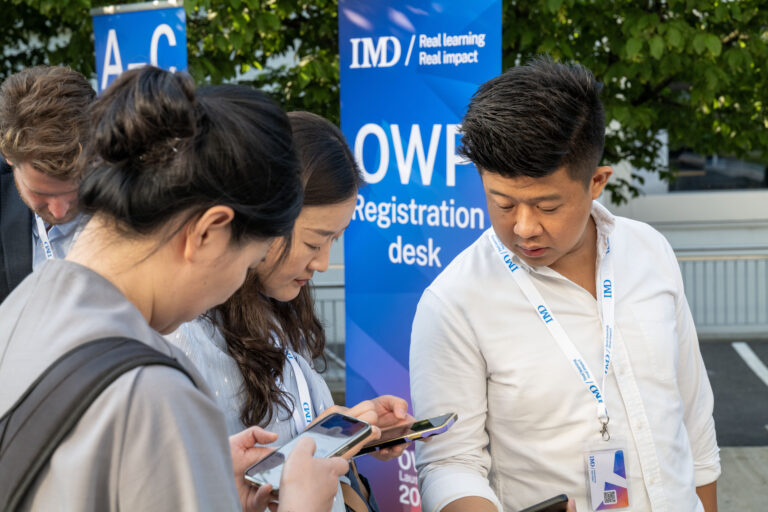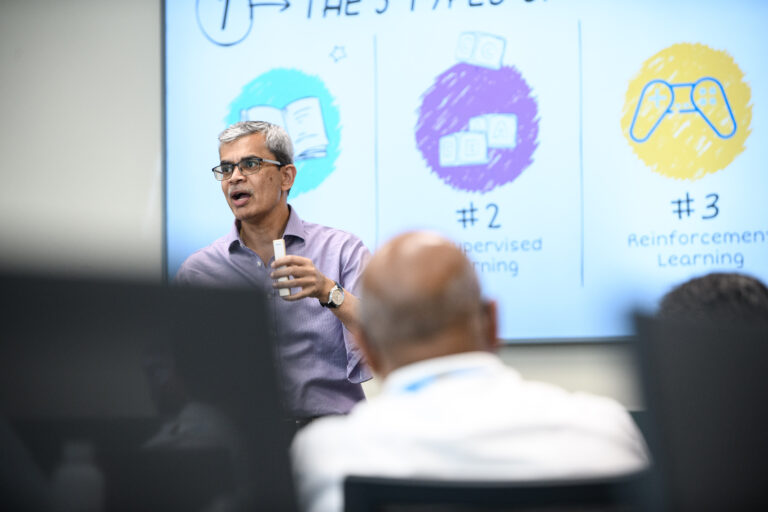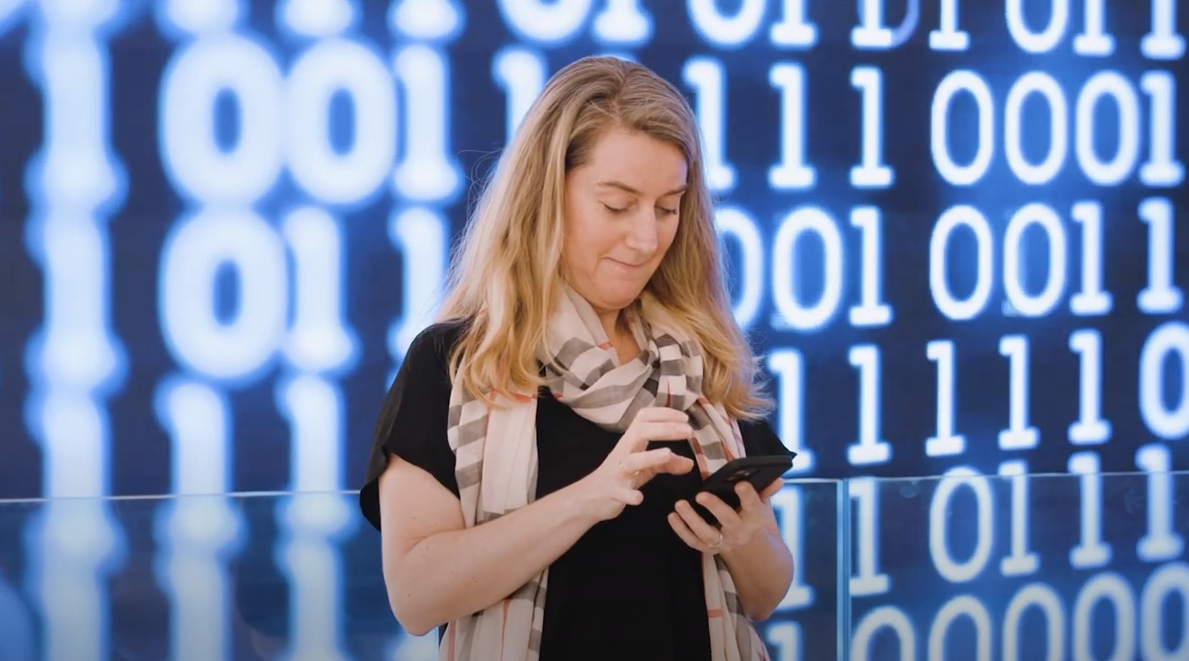Imagine you are a business executive enrolled in an education program. You have soaked in hours of insightful content from world-class professors and participated in engaging debates and discussions with classmates, all guided and facilitated by coaches and faculty. The course ends, you go back to your daily routine, digest as much information as you can remember and, during that process, come up with dozens of follow-up questions related to what you have learned. So, you pick up your phone, type in the questions, and receive precise and specific answers. It’s not the general flavor of ChatGPT that everyone has access to, but it’s as though the program has continued and you still have access to faculty expertise any time you need it.
Well, imagine no longer. The scenario above is exactly what IMD offered last month to the participants of its signature program, Orchestrating Winning Performance (OWP).

The 450 participants in Lausanne were given access to OWP+GPT, an innovation developed by IMD that is elegant in its simplicity. First, it makes sense of hours of classroom sessions, and adds further depth to the classroom topics covered with the addition of a corpus of IMD information, such as research, articles, podcasts and webinars. Next, a mobile webapp allows participants to engage with the session and ask questions. IMD’s ChatGPT answers the question by utilizing what was discussed in the session, plus the relevant corpus information and utilizing OpenAI’s GPT-4 to round out the answer.
At OWP, approximately 40 hours of sessions were AI-powered, and users promptly made good use of this capability: throughout the week, more than 700 queries were inputted in no fewer than 23 different languages. OWP participants were also given access to a plugin connected to OpenAI’s DALL-E 2 and invited to share their key takeaways in the format of text-to-image prompts.
“I’d never used ChatGPT until I came to IMD,” said Schauna Chauhan, CEO Parle Agro.
“I can’t draw, I can’t paint. I put in those words and suddenly there was a painting expressing what I felt.”
The OWP experiment is just a glimpse at what IMD has in sight when it comes to leveraging AI to increase the impact of the learning process.
“What I’m excited about is personalized education at scale: enabling people to continue to learn way beyond the time they may have spent with us in a physical or virtual classroom,” says David Bach, Professor of Strategy and Political Economy and Dean of Innovation and Programs. “It’s almost like you could walk to the professor in the front of the room and ask a question about the session, except that the whole thing happens three days later, and you might not even be in the same place anymore.”
The revolution will definitely not be televised
The massification of AI technology promises to bring about such a degree of transformation that the effects for institutions like IMD are bound to be felt way beyond the enhancement of existing offerings: brand new opportunities are all but certain to arise.
“GenAI and ChatGPT technologies allow us to deploy all of the science we have on how to be a more effective executive to millions of middle level managers in countries like India, China, Indonesia, or Brazil,” exemplifies Misiek Piskorski, Professor of Digital Strategy, Analytics, and Innovation and Dean of IMD Asia and Oceania.
“We’re still at the very beginning of the AI revolution”
-David Bach, Professor of Strategy and Political Economy and Dean of Innovation and Programs
The collective feeling present across society today rings just as true in executive education: what we’re experiencing is just the tip of the iceberg; rough sketches that in only a few years’ time will already feel archaic.
“We’re still at the very beginning of the AI revolution,” summarizes David Bach. “Everybody is excited about ChatGPT, so it seems as if we discovered this yesterday, but the technology has been around for a decade or two. What the likes of ChatGPT have provided is a universally accessible interface, much the same way that the introduction of the browser made the internet accessible to a much broader audience in 1994 or 1995. We are in early 1995 in terms of internet time, and we all know what’s happened in the last 25 years or so. Just to give a sense of the number of exciting developments that are potentially ahead.”
The challenge, then, is to ensure that the developments are somehow guided and thought through, and that something quintessentially positive comes out of the revolution, whatever form it may take.
“AI has been referred to as a foundational technology, like electricity or the internet. As such, it can profoundly reshape our society: what we do for a living, the kinds of jobs we have, how economies develop… It has the potential to make all our lives better but, used in the wrong way, it can also negatively impact our lives in so many ways. As goes the saying: ‘with great power comes great responsibility’,” warns Amit Joshi, Professor of AI, Analytics and Marketing Strategy.

The advised caution is not a matter of sensationalist fatalism or sci-fi-like, cyborg-led destruction coming into play. It’s not even only related to the most obviously consequential – and already present – misuses of AI, such as spreading disinformation. It is important that prudence and consciousness in relation to AI are pre-emptively at the top of the agenda of every decision-maker, notes Öykü Işık, Professor of Digital Strategy and Cybersecurity, highlighting that the implementation of GenAI-powered initiatives at IMD has been carried out with the utmost diligence in regard to legal frameworks and data protection implications.
“I am very positive about the value of AI in business, but I’m also acutely aware that many things are often ignored about this. So, we have to make sure that these aspects are taken into consideration and that our leaders, our executives, push the responsible AI agenda in their organizations,” says Işık. “We often underestimate how quickly things develop. So, if a topic still seems far away in the future, such as having robots as co-workers in the workplace, I hope our executives start thinking of the potential implications of this already today.”
Education first
“If there’s a field that is and has always been prime for disruption – revolution, even – that’s education”, claims IMD’s Chief Learning Innovation Officer, Sarah Toms, contemplating how the wave of new AI capabilities is going to push that disruption even further: “What we’re going to see now is hyper personalization coming to life: more interactivity, less of the passive learning modes, and the learners’ ability to engage not only in courses and degrees for a certain period of time, but to go into life-long growth.”
Thriving in this fast-changing space is less a matter of being early adopters than it is of being early experimenters, argues David Bach. “We don’t know what the potential of this technology is, and we have to develop responsible use cases, think through some of the implications… But you can really only do that if you’re in the arena: if you’re building capabilities, experimenting, engaging with users, learning, critically reflecting on what you’re doing… We’re really excited that we’ve been able to do this at IMD over the past few days and we look forward to continuing doing this in the months ahead.”



